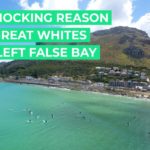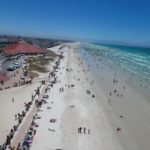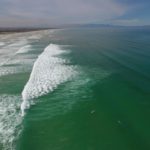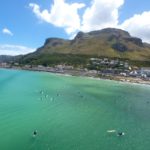The shocking reason why great whites have left False Bay
Sep 10th, 2019 Kelly-Jane Turner 751 Views
- All images credit to Shark Spotters
- All images, please credit Shark Spotters
- Shark spotters
Shark Spotters CEO Sarah Waries, says that while it is never easy to understand exactly what’s happening on an ecosystem scale, one of the explanations of the great whites’ disappearance could be due to the presence of a specific type of orca.
There has been evidence of orcas feeding on great white sharks, sevengill shark and bronze whaler sharks around False Bay. The orcas are not consuming the whole shark, they are disabling the sharks by tearing open their pectoral girdle or their chests and the orcas suck out the liver of the shark.
Waries explains that “the liver is incredibly rich in nutrients and in white sharks the livers take up to a third of its body weight. They are very big because they are used for buoyancy control. So if you’ve got a one ton shark you’ve got a third of a ton of liver and they are sucking out the liver and consuming it that way.”
“The lack of white sharks can have really significant ecosystem impacts, we are not entirely sure the extent of those at this moment, and that’s why we are doing more research within False Bay and along the South African coastline to try and understand but it could have significant effects.”
SUBTITLES- FOR MORE INFO
Sarah Waries, Shark Spotters CEO
“We’ve seen a significant reduction in white shark activity over the last eighteen months to two years.
And where previously in 2014/2015 we would average about 200 or above 200 sightings in a year.
In 2018 we only had 50 white shark sightings, and so far in 2019 we haven’t recorded, or had any confirmed white shark sightings within False Bay. The reasons for this are a little bit unclear. It’s never easy to understand exactly what’s happening on an ecosystem scale. One of the most significant effects seem to be the presence of a specific type of orca which we have only started recording in False Bay since 2015.”
“And this specific eco type of orca feeds on shark species. We’ve seen evidence of them feeding on white sharks, sevengill shark and bronze whaler sharks here in False Bay. And it does appear that when the orcas come in the sharks leave the bay, and particularly the white sharks take a long time to return.”
“This type of thing has been seen in other areas as well with these shark eating orcas, in the Farallon Islands just off the coast of California. They have the same thing where the orcas turn up and sharks actually left the area for over a year before they returned again.”
“The interesting thing is these orcas that are predating on sharks, they are not consuming the whole shark, they are actually somehow disabling the sharks and then they tear open their pectoral girdle basically their chest, and they suck out the liver of the shark and that is all that they eat. And that is because the liver is incredibly rich in nutrients and in white sharks the livers take up to a third of its body weight, they are very big because they are used for buoyancy control. So if you’ve got a one ton shark you’ve got a third of a ton of liver and they are sucking out the liver and consuming it that way.”
“Ocras.. There’s never been any reports of orcas attacking people in the wild, obviously we’ve all heard the high profile things in captivity, but in the wild there never has been. And so the orcas don’t pose a significant threat to people in False Bay. We also interestingly don’t see them regularly, so we are only seeing them two or three times a year, but those short visits seem to have very big impacts on shark distribution. Also, the very interesting thing is these specific orcas, there’s actually only two individuals, so it’s two individual orcas that are having these wide scale ecosystem impacts. Which is very interesting, so it’s not like we are seeing massive pods of orcas, it’s two individuals orcas that specialise in eating sharks.”
“In terms of beach safety, with obviously less shark activity there is a reduced risk of shark bite or shark encounters. This doesn’t mean that there is no risk. So the sharks could return at any time and often we don’t know they’ve returned until we start spotting them. It really is important that people still remain vigilant.”
“We started noticing a significant decrease about two years ago and it started dropping off, and this year, as I said we’ve had no white shark sightings. The lack of white sharks can have really significant ecosystem impacts, we are not entirely sure the extent of those at this moment, and that’s why we are doing more research within False Bay and along the South African coastline to try and understand but it could have significant effects.”
“Similarly, there’s an economic impact because the shark cage diving tourism sector has also suffered with a lack of great white sharks in False Bay.”




